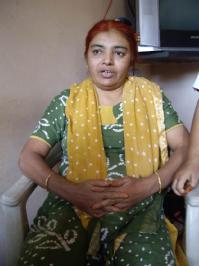Sugrabai Mohammed Farooq Khatri
|
Age: 45 Education: Class three. Place of residence: Bhuj Date: 9/11/2012 |
Full Interview |  |
Interview Summary
Sugrabai, who has worked for Jabbar Khatri’s bandhaniexporting house Sidr Craft for six years, is a highly skilled bandhaniworker. She did not complete her schooling because, according to her, in those days education was not considered importance by her family and she was compelled to do household work to help her mother. Her parents were also very poor and could not afford to send their children to school. Consequently, Sugrabai and her three sisters learnt to tie bandhani from a young age. Out of her two brothers, the elder one went out to work and the younger one went to school.
Sugrabai says that for tying 4,000 bhindi, or 1,000 kadi, she used to earn 150 rupees, but now this has increased to 200 rupees. Describing her working hours, Sugrabai told us that in the morning, after finishing her household work she gets some time for tying. At around eleven, she cooks lunch and continues her chores. Thereafter, following a small nap between 3 and 3.30 pm she starts tying again until seven when she prepares an evening meal. At night, the family go to bed at 10 pm and wake up early and start another day’s routine. With such demands on her time; looking after her young daughters and meeting her social obligations, Sugrabai is not able earn more than 2,000 rupees a month despite the fact that she is a proficient at the finest tying. She believes that other women in her quarter earn up to 5,000 rupees as they can work all through the day. Her second daughter used to help her with the tying but now she has moved on to stitching and mehndi. Her husband, who was a vehicle driver and now working at a hotel, earns 5,000 a month. He once had a small bandhanibusiness but left the craft because of a lack of capital. Sugrabai strongly feels that investment is key to making an enterprise profitable.
Having five daughters worries her greatly because of the financial implications. Her eldest daughter married in a community organised mass-marriage, where she only had to contribute around 5,000 rupees. Her second daughter is engaged and will soon get married. The third daughter, who is seventeen year old and helping her mother with the household chores, also knows how to tie and has been doing it for the last three or four years. Sugrabai says that the girls learn the craft just by sitting with her, and they have taken it up with ease. Living with financial restrictions in a traditional society she does not harbour any great dreams for her remaining two daughters who are taking their education in a Gujarati government school.
Discussing her employer Jabbar Khatri and his family, she feels that they are generous and helpful, especially when she needs some financial help. She is not aware about her employer’s exporting business or about his other workers.
During the earthquake Sugrabai’s mother slipped under the debris but was fortunately saved. The family have lived in rented accommodation for five generations and Sugrabai is thankful to her community as they allow her to stay in the house for a nominal rent.
Originally from Mundra, Sugrabai has lived in Bhuj for twenty-five years. She feels extremely constrained by all her current responsibilities and looks forward to a bit of breathing space from everything she carries on her shoulders.
